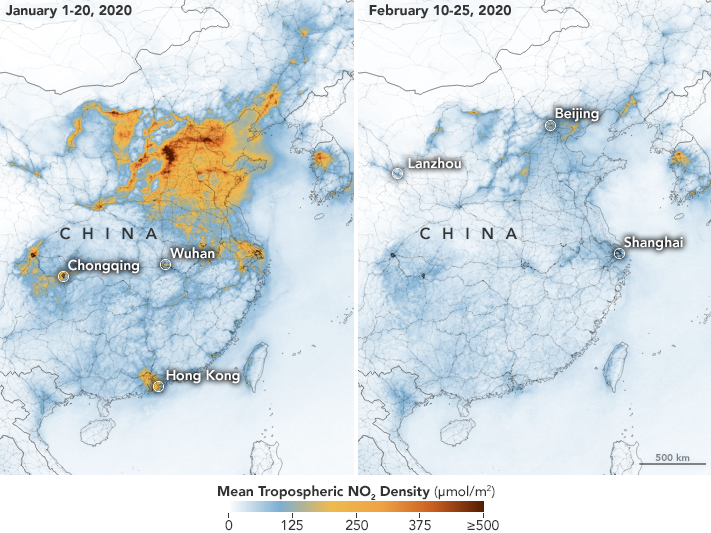Coronavirus: Air pollution and CO2 fall rapidly as virus spreads
Fewer vehicles and less output from key industrial sectors lead to drop in emissions
Amid travel bans, self-isolation orders and movement restrictions taking place all over the world as the coronavirus pandemic continues to spread, researchers are discovering the outbreak may be generating positive effects on the environment.
Levels of air pollution in some cities and regions have reduced significantly as coronavirus stops people from constantly travelling to work or abroad.
According to the BBC, researchers in New York said early studies have seen carbon monoxide, mainly produced by cars, decrease sharply by nearly 50 per cent compared with 2019.
CO2 emissions, which contribute to climate change by warming the planet, have also seen a decline in recent days.
Traffic in New York has plummeted since executive orders aimed at getting citizens to practice social distancing were implemented earlier this week.
According to data tracking company TomTom, traffic congestion levels dropped by 13.5 per cent between 9 and 13 March compared to the same week in 2019.
During rush hours in the same period, traffic congestion dropped by more than 26 per cent.
Researchers at Columbia University found emissions of carbon monoxide fell by around 50 per cent for a couple of days this week, and detected a 5-10 per cent drop in CO2 over New York City.
The findings may be preliminary, but they are similar to the environmental impact seen in China and Italy, where lockdowns have been ongoing for several weeks.
According to the European Space Agency, the Copernicus Sentinel-5P satellite revealed a decline in air pollution over Italy, specifically nitrogen dioxide (NO2) emissions.
Claud Zehner, the satellite’s mission manager, said: “The decline in nitrogen dioxide emissions over the Po Valley in northern Italy is particularly evident.
“Although there could be slight variations in the data due to cloud cover and changing weather, we are very confident that the reduction in emissions that we can see, coincides with the lockdown in Italy causing less traffic and industrial activities.”

In China, researchers found a reduction of 15 per cent to 40 per cent in output across the country’s key industrial sectors, including coal, oil refineries, and flights.
“This is likely to have wiped out a quarter or more of the country’s CO2 emissions over the past four weeks, the period when activity would normally have resumed after the Chinese new year holiday,” wrote Lauri Myllyvirta, an analyst at the Centre for Research on Energy and Clean Air.
Writing for climate science website Carbon Brief, Mr Myllyvirta added average levels of NO2, which is closely associated with the burning of fossil fuels, were 36 percent lower in the week after the Chinese near year holiday this year compared to the same period in 2019.
But while the data points towards an overall drop in emissions in places under lockdown, scientists warn emissions could still be produced in large quantities by people staying at home.
Spending more time at home, particularly in cold weather, means turning on heating and appliances for longer periods of time.
Christopher Jones, a climate policy expert at the University of California, Berkeley, told the Scientific American that using more energy at home would “more than offset the savings from not driving your vehicle to work”.
Join our commenting forum
Join thought-provoking conversations, follow other Independent readers and see their replies
Comments
Bookmark popover
Removed from bookmarks